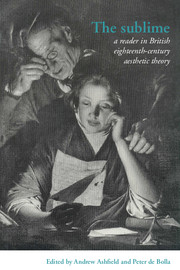Book contents
- Frontmatter
- Contents
- List of Abbreviations
- Introduction
- Part I The Longinian tradition
- Part II Rhapsody to rhetoric
- Part III Irish Perspectives
- Part IV The Aberdonian Enlightenment
- Part V Edinburgh and Glasgow
- 34 A treatise of human nature (1739-40)
- 35 A critical dissertation on the poems of Ossian (1763)
- 36 Lectures on rhetoric and belles lettres (1783)
- 37 Elements of criticism (1765)
- 38 Essays on philosophical subjects (1758/1795)
- 39 The theory of moral sentiments (1759/1790)
- 40 An essay on the history of civil society (1767)
- Part VI From the Picturesque to the Political
- Sources and further reading
37 - Elements of criticism (1765)
Published online by Cambridge University Press: 05 June 2012
- Frontmatter
- Contents
- List of Abbreviations
- Introduction
- Part I The Longinian tradition
- Part II Rhapsody to rhetoric
- Part III Irish Perspectives
- Part IV The Aberdonian Enlightenment
- Part V Edinburgh and Glasgow
- 34 A treatise of human nature (1739-40)
- 35 A critical dissertation on the poems of Ossian (1763)
- 36 Lectures on rhetoric and belles lettres (1783)
- 37 Elements of criticism (1765)
- 38 Essays on philosophical subjects (1758/1795)
- 39 The theory of moral sentiments (1759/1790)
- 40 An essay on the history of civil society (1767)
- Part VI From the Picturesque to the Political
- Sources and further reading
Summary
Chapter IV
Grandeur and sublimity
Nature hath not more remarkably distinguished us from the other animals by an erect posture, than by a capacious and aspiring mind, attaching us to things great and elevated. The ocean, the sky, seize the attention, and make a deep impression: robes of state are made large and full to draw respect: we admire an elephant for its magnitude, notwithstanding its unwieldiness.
The elevation of an object affects us not less than its magnitude: a high place is chosen for the statue of a deity or hero: a tree growing on the brink of a precipice, looks charming when viewed from the plain below: a throne is erected for the chief magistrate; and a chair with a high seat for the president of a court.
In some objects, greatness and elevation concur to make a complicated impression: the Alps and the pike of Teneriffe are proper examples; with the following difference, that in the former greatness seems to prevail, elevation in the latter.
The emotions raised by great and by elevated objects, are clearly distinguishable, not only in the internal feeling, but even in their external expressions. A great object makes the spectator endeavour to enlarge his bulk; which is remarkable in plain people who give way to nature without reserve; in describing a great object, they naturally expand themselves by drawing in air with all their force.
- Type
- Chapter
- Information
- The SublimeA Reader in British Eighteenth-Century Aesthetic Theory, pp. 224 - 232Publisher: Cambridge University PressPrint publication year: 1996



